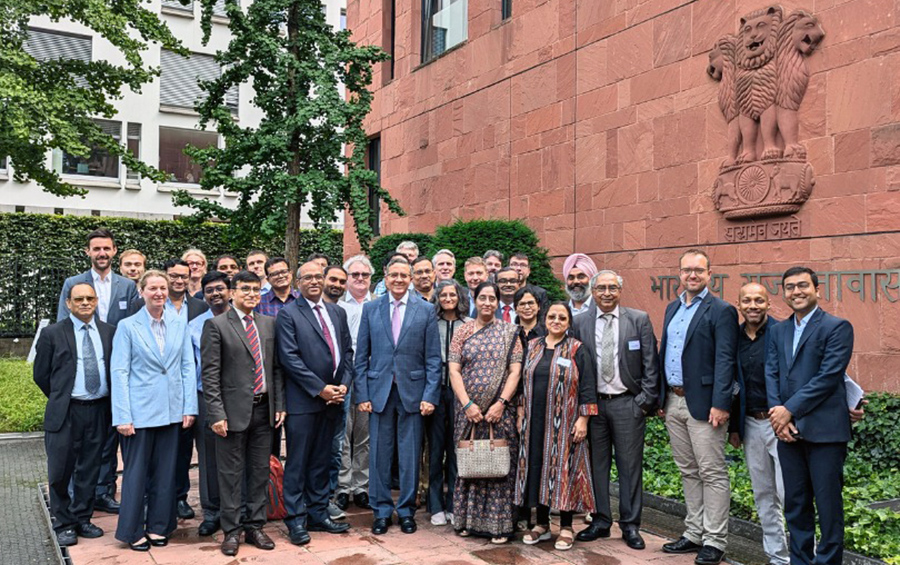Picture Credit: @Embassy of India, Berlin
India and Germany are strengthening their collaboration in the field of artificial intelligence (AI), with a renewed focus on trustworthy, explainable, and inclusive technologies. A high-level workshop and a roundtable held in Berlin from July 14 to 15, 2025, brought together policymakers, researchers, and industry leaders from both nations to explore common frameworks for AI metrics and new avenues for joint research, innovation, and governance.
AI Metrics Workshop in Berlin Highlights Trust and Reliability
The Indo-German Science & Technology Centre (IGSTC) funded a two-day workshop on “Metrics for Measurement of Artificial Intelligence for Trustworthy, Reliable and Explainable Applications,” held on July 14–15, 2025, at the Physikalisch-Technische Bundesanstalt (PTB) in Berlin. The initiative drew participation from top Indian and German institutions, under the umbrella of India’s Department of Science & Technology and Germany’s Federal Ministry of Education and Research. Mr. Abhishek Singh, Additional Secretary at India’s Ministry of Electronics and Information Technology (MeitY), also attended the workshop, engaging in discussions around standardizing AI frameworks and advancing bilateral cooperation.
On July 15, 2025, the Embassy of India in Berlin hosted a dedicated Indo-German roundtable on AI metrics, bringing together 40 experts from leading research organisations and industries from both countries. The session provided a platform to align priorities in AI development and regulatory approaches.
Ambassador Ajit Gupte, India’s envoy to Germany, emphasized New Delhi’s commitment to inclusive and ethical AI. “India’s initiatives in AI are rooted in inclusivity, and this collaboration with Germany opens up avenues for building effective and globally relevant AI governance structures,” he said during the roundtable.
MeitY Delegation Explores Research Opportunities at Fraunhofer IPK
Also on July 15, a high-level MeitY delegation visited the Fraunhofer Institute for Production Systems and Design Technology (IPK) in Berlin to explore collaborative research opportunities.
The delegation included Mr. Abhishek Singh, along with Ms. Kavita Bhatia and Mr. Niranjan Mukherjee from the Embassy of India in Berlin, who engaged with German researchers to understand ongoing innovations in AI for industrial and digital applications.
“Our visit highlighted promising areas of Indo-German cooperation in applied AI, particularly in the manufacturing and digital transformation sectors,” Mr. Singh noted during the exchange.
The Indian delegation was welcomed by Prof. Dr. Holger Kohl, Deputy Director at Fraunhofer IPK, who led a knowledge-sharing session along with Dr. Ralf Schäfer from Fraunhofer Heinrich Hertz Institute (HHI).
Dr.-Ing. David Domingos presented Fraunhofer’s international collaborations, including projects across Europe and Brazil. Nicole Oertwig showcased how business process reengineering can power digital transformation, while Kevin Haninger detailed their approach to robust, high-speed robot assembly. Sonika Krishna G provided an overview of ongoing work in digital engineering.
Live Demos Showcase AI in Action
The visit concluded with a live tour of Fraunhofer’s AI labs, jointly hosted by experts from Technische Universität Berlin. Demonstrations included AI-based assistance systems and real-time energy monitoring in industrial production environments. The sessions highlighted applied research that could benefit both Indian and German industries. The visit was facilitated by Anandi Iyer, Director of Fraunhofer Office India, who has played a pivotal role in fostering Indo-German R&D cooperation.
A Strategic Tech Partnership for the Future
The engagements on July 14–15, 2025, signal a growing commitment between India and Germany to co-develop frameworks for trustworthy AI, build scalable industrial solutions, and shape a globally resonant regulatory ecosystem. As both nations look to harness the transformative power of AI, their cooperation is poised to deepen across domains — from research and policy to real-world industrial applications.

